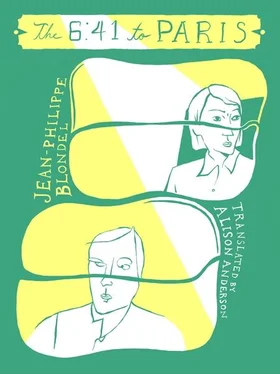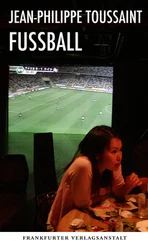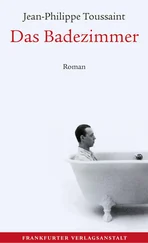I’m not looking for excuses.
And then, she was gaining power.
Insidiously.
She was nothing to look at, with her ordinary face, slightly curly shoulder length hair, and clothes that came straight from a discount superstore. She would listen to me talking. People who listen always end up in a position of superiority; they don’t share their secrets, they remain whole, intact, whereas you’ve allowed your flaws to show through.
And then she—
No, it’s really hard to remember this.
Years later, it’s still hard to come out and admit it.
It’s crazy how sex can still haunt you even after so much time has gone by.
How should I put it? She knew how to relax me? Make me hard? Make me stay hard? Reassure me? All of that at the same time. I should have been grateful. But it was the opposite. I felt sure that some day she would go and make fun of me, in public. Which was idiotic. But when you’re twenty years old, you have no critical distance, your vision is really limited to what’s close-up, there before you.
I was so relieved when she slammed the door that night.
There I was in the London night. Alone and accompanied at the same time. I had a headache. The alcohol made my gestures uncertain — and yet, I was relieved.
One less burden.
And now I don’t understand. I don’t understand myself.
I’ll talk about it with Mathieu.
It’ll be a good topic of conversation, for a start. Maybe by going back over all this old stuff, by bringing the world of a quarter of a century ago back to life, we’ll manage to get through thirty or forty minutes. An hour. And after that, he’ll be calm. Yes, that’s a good idea, I’ll talk to him about Cécile Duffaut.
I’m afraid.
I know I am because the vein on the right-hand side of my neck has started throbbing.
Unless it’s a nerve.
Do we have nerves in our neck?
I don’t know what sort of state I’ll find him in.
My last visit was ten days ago. He wants me to come more often. He wants me to be there every day. He would like everyone to be there every day, but now that he’s in the hospital, the others don’t come anymore. Sometimes they call. They send presents. They send text messages. But they don’t actually go. Something always comes up. They were all ready to go, it was all planned, cross my heart and hope to die, we’ll be there tomorrow afternoon, and two hours before they were supposed to be there, with Mathieu getting more and more impatient, they call and say they’re really sorry, their voices full of contrition, but really, they simply can’t make it, a really important program, an appointment that could change their life, the dishwasher has broken down completely unexpectedly and the kitchen is flooded. Mathieu smiles valiantly (and I feel like shouting: “Mathieu, you’re on the phone , they can’t see you, stop smiling”), then says again in a weary little voice that it doesn’t matter, it’s no big deal, some other time, and he finds excuses for them after all, it’s true, they have to get on with their lives.
I don’t say anything.
I think: with me it’s different.
I’m trying to sound ironic, with limited success. Because it’s true, after all, with me it’s different.
I don’t have anything special to do, other than my job and my divorced family.
Mathieu’s cancer is an event.
I have such a thrilling life.
It started a few months ago now. Not long after he broke up with Astrid. He wasn’t in great shape. He was losing weight, which was normal, he was hardly eating. He didn’t feel like going out, or having people over. He had headaches all the time. Even he was surprised. He didn’t think their breakup would affect him so much.
“How long did it last in all?”
“Ten months. A year.”
“On the scale of a lifetime …”
“I know. That’s why I don’t understand why I can’t get my act together.”
“You’re getting old.”
“I suppose. And besides, you know, when I think of you with your kids, I tell myself that maybe I’ve missed out on something.”
“Well, me and my kids, it’s not as if we’re together all that much. They’ve found a dad who is exactly what they were looking for.”
“Don’t say that. You know very well that everyone only has one dad.”
“I’m not so sure.”
“Well, I’ll never know, since I’m not a father.”
“How do you know? You’ve left your sperm in a fair share of women.”
“I’m being serious.”
“Just look at the life you lead. What would you do with a kid? Kids need stability, guidance, routine.”
“Depends on the kid.”
I broke off the discussion. I could tell it wasn’t going anywhere. To change tack, I said, “Maybe you should see a doctor. You never know, it might have nothing to do with Astrid. It might only be physical.”
Mathieu liked the idea that it might “only be physical.” Some other thing that wouldn’t weigh on his mind. Rational. Explainable. Medical.
He liked it a lot less when the results came in.
He’d lain in bed for hours. He called me. He had a strange metallic voice. Like the Tin Man in the Wizard of Oz. I took the first train, the same 6:41. It was in the middle of the February school break. I moved into his place. We talked the way we’d never talked before. Whenever I went out to go shopping or just to have a break, he would try to call people he knew, people I’d met at parties. The ones he got hold of were full of sympathy. His life seemed sad to me.
I sat in cafés in Paris and wrote letters to my children. Some day I may send them. But what would they make of them? In the letters I referred to a whole list of unfamiliar names, people they’ve never met, places they’ve never seen. When parents tell their stories it’s anything but clear, and it’s probably better that way. I toyed with the idea of writing a novel, too. I don’t have the talent. Nor, in all likelihood, the desire.
I wonder how Cécile gets along with her children. I see my kids only in brief spurts now that they’ve moved. No, that’s not fair. I don’t think it’s really because of the change, or because of their new stepfather. It’s their age. They’re learning to keep their distance. One day Loïc and I went to visit the cathedral. He was three or four years old. He couldn’t have cared less about the building. All he could see was the yellow balloon I had just bought for him. One of those helium balloons with a white plastic wand. I like hanging around the cathedral. That’s where I kissed my first conquest, behind a pillar. I’ve always thought there was something erotic about churches: the silence, the cool air, the stone, the fact that someone might go by, the feverishness, the transgression. I was thinking back about that moment. I was wondering what had become of that girl I kissed, whom I never saw again — or if I did, I didn’t recognize her. Loïc let go of his balloon, right there in the nave. Up, up, up went the balloon, all the way to the rose window, and then higher still, until it got stuck beneath a gothic arch, way above our heads. It looked tiny. There was no way we could reach it. Loïc was inconsolable. He didn’t want another one to replace it. He went home, crestfallen.
The next day I went back to the cathedral. The balloon was still there, hardly visible. I went back every day. I don’t know why. I figured that sooner or later it would burst or deflate and end up back on the ground — and then, I would take the plastic remains to my son. He would smile and keep them. One evening, the balloon was gone. Not a trace, either on the ground or in the air.
Children are like that. Like helium balloons in cathedrals. Let go of them, and they will fly off, but they’re still in sight, you wave to them, you visit them, and they’re way up there, far away, still stuck beneath our gothic arches. Then one day, and you never quite know why, they’re no longer anywhere to be seen.
Читать дальше












